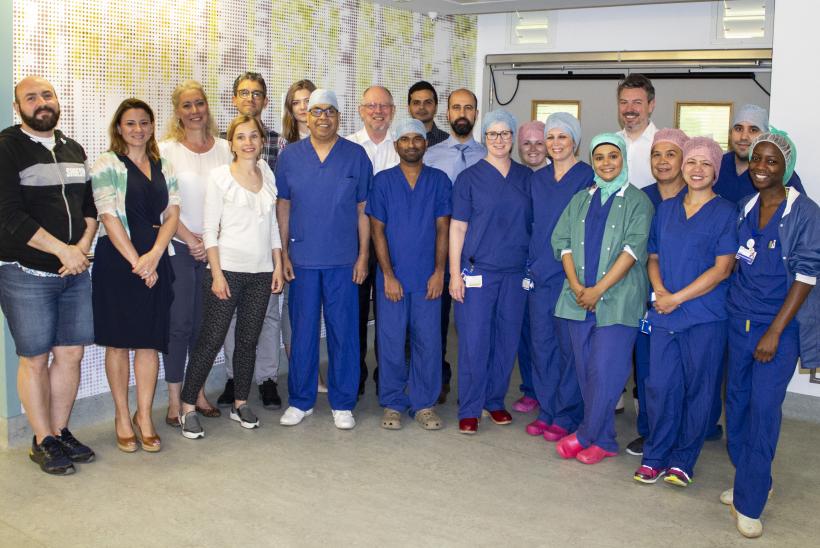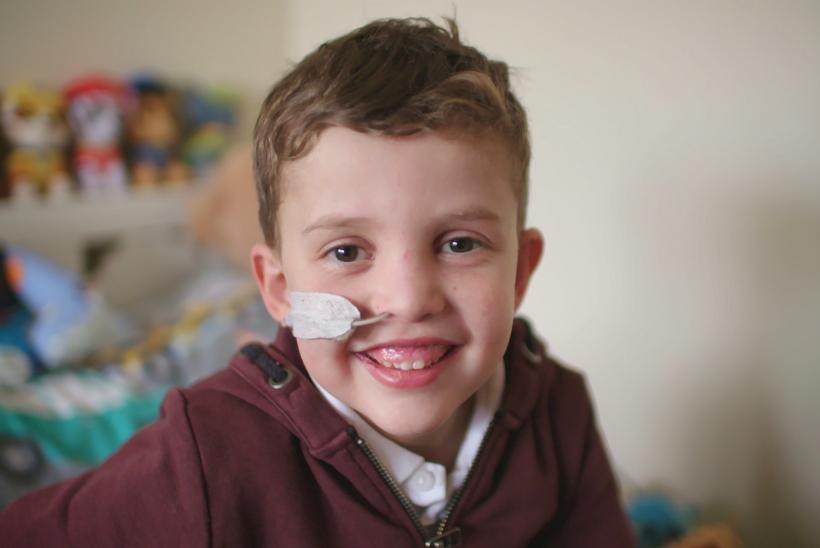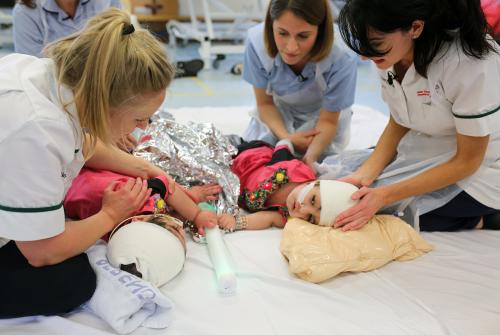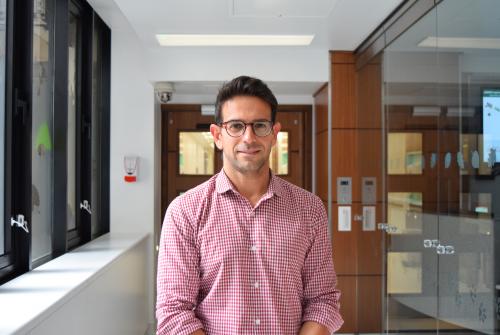Multidisciplinary Teams (MDTs)

A Multidisciplinary Team (MDT) is a group of professionals from one or more clinical disciplines who come together to make decisions about the recommended treatment of individual patients.
At Great Ormond Street Hospital (GOSH), MDTs consist of clinical consultants, specialist nurses, consultant radiologists, consultant pathologists, allied health professionals and sometimes social work and support services. All staff are in the same physical or virtual room at the same time, reviewing the same information and sharing knowledge and thoughts on the condition and its management.
The power of the MDT
The MDT approach is an effective and efficient way for staff to gain a holistic view of the child and family. The approach allows for regular communication and collaboration between expert clinicians and support services, allowing children to receive the best possible care.
The benefit to patients and families
At GOSH the child is considered at the centre of everything; every child, and their condition and circumstances, is recognised as being unique. We also have individual patient MDT meetings bespoke to the specific patient's needs.
We are dedicated to providing:
- Child-Centred Clinical Decision-Making
- A holistic and integrated approach to care and support
- A strong, cohesive multidisciplinary approach in rare and complex cases
- Greater continuity of care across different care settings

Noah had lots of blood tests and scans to give us a better picture of his complex blood vessels, and he was also seen by our cardiac specialists, anaesthetists and neurosurgeons ahead of the surgery. The final decision is made in a multidisciplinary team meeting with all the different teams who are involved in Noah’s care, and in consultation with his parents too.
Specialties and services included in the MDT
All our 64 paediatric clinical specialties and sub-specialties hold regular MDT joint meetings.
The multidisciplinary pain management service at GOSH was the first in the UK and continues to be a nationally and internationally recognised leader and innovator in the field of pain assessment and treatment. The pain control team works closely with other teams to ensure the best treatment for children and young people with acute and chronic pain.
Moreover, Allied Health Professionals (AHPs) play an integral and vital role at GOSH. This group of independent practitioners contribute to MDT assessment and work in a wide range of different roles including physiotherapists, psychologists, occupational therapists, music therapist, speech and language therapists, dietitians, radiographers, podiatrists, orthoptists, and so on. AHPs provide diagnostic, technical, therapeutic, and direct patient care and support services that are critical to the care of our patients.
Apart from clinical teams, GOSH has the largest hospital Play Team in Europe, who have helped thousands of seriously ill children deal with their treatment and recovery through specialised therapeutic play.
The process of GOSH MDT meetings
MDT meetings of most specialites are held weekly, but some specific disease MDTs may happen bi-weekly or monthly.
The patient’s consultant or their teams will present the case. The team may then ask the wider MDT for their thoughts on the diagnosis (this will include radiologists and pathologists). Other members of the wider MDT team may share their experience of similar conditions, diagnostic difficulties, risks, or new treatments. A treatment plan is discussed, often at length and then agreed, which is scribed in the notes. If the patient’s consultant receives new information from further tests, or if there is a complication, they will bring the case back to the MDT for further discussion and problem-solving.
We efficiently update a child’s electronic patient record with results from the discussion so that all clinicians treating the child can see the results of the MDT at any time.
GOSH has very professional anaesthesia and pain management teams, who helped my daughter a lot, and to avoid her suffering from a lot of pain. We are lucky that we benefitted from the multi-specialty approach at GOSH and the whole process is so smooth.
Exploring more about GOSH MDT approach
MDTs have been held in University teaching hospitals in the UK since at least the early 1980s, and first started in cancer care before expanding to other specialities. In the mid-1990s the Calman-Hine report identified this as the gold standard and it was mandated in the National Cancer Plan in 2000, a pledge that all patients with cancer would have their care reviewed by an MDT and this is now universal for every patient (adult or child) in the UK. GOSH developed the MDT approach in the 1980s and 1990s and it is now very established in every speciality.
For paediatric patients there is generally no one set treatment pathway as it will entirely depend on the child’s age and condition. A treatment that might be appropriate at age one year may not be appropriate at age six years. Our MDT approach takes this into account.
Furthermore, some treatments in children (for instance in the treatment of congenital cardiac disease) may be much improved by a staged approach – but these need to be planned from the beginning and an MDT is the setting in which this can be agreed and documented. Paediatric patients are much more likely than adults to have conditions that are either congenital or genetic, or both. At GOSH each child is considered individually, and their treatment does not necessarily follow a predetermined plan.
There is ALWAYS a collective and agreed treatment plan from the MDT. If anyone disagrees it is discussed again so those concerns are heard. The General Medical Council (the licensing body for doctors in the UK) dictates that doctors must ‘make the care of your patient your first concern’.
For more details, please visit https://www.gmc-uk.org/ethical-guidance/ethical-guidance-for-doctors/good-medical-practice/duties-of-a-doctor.
All patients with complex conditions will be discussed in an MDT. This accounts for the vast majority of our patients.
We would never consider treating a complex case without an MDT(s). All of our outcomes are compulsorily sent to the relevant registries. For example, in terms of congenital heart disease, National Congenital Heart Disease Audit (NCHDA) Summary Report shows GOSH to have both the highest number of cases and the greatest number of survivals over predicted AND similar information for 5-year survival for childhood cancer.
Yes, international patients are discussed in MDTs in the same way as UK patients and a similar record is made. It is also possible to have a smaller MDT of specific clinicians discuss a case with the patient’s local doctors based in their home country.
We have now moved MDTs over to a virtual platform, so we are able to make sure that the relevant experts can always attend wherever they are. Moving the written record of the discussion into the electronic patient record has meant we can more accurately capture the discussion and agreed outcome.
If you would like to request a Telehealth MDT (remote) for your child or one of your patients, please enquire here.
EPIC is an electronic patient record that brings together all the patients' information in one place. By reducing the need for paper records, the most up-to-date information can now be accessed by a patient’s entire clinical team at the tap of a button. This helps the hospital give, through Epic, every child and family the best care and experience possible. Through MyGOSH, our online patient portal, families now have secure remote access to information about their child’s care, including scheduled appointments, test results and more.
GOSH is an international centre of excellence in paediatric care, globally recognised as one of the few world-class hospitals for children suffering from rare, complex or multiple conditions. Almost every child at GOSH will be discussed in an MDT at some stage. For children with ongoing conditions they will be discussed many times. All requests for MDT discussions are now listed in advance through EPIC. As such for every MDT (most of which are weekly) there will be an electronic patient list that links directly to the individual patient record. The standard format is that a clinical question is listed and that the case and the clinical question is then discussed. Those contributing to the discussion are listed in the patient record and the collective decision about the next steps of management. This is then instantly available to anyone caring for the patient, so they all know the plan. There is also a permanent record of how the decision was made.
Read more about our MDT patient cases
-
 Rare conjoined twins separated at Great Ormond Street Hospital
Rare conjoined twins separated at Great Ormond Street Hospital -
Pioneering heart procedure saves Emirati baby’s life26/09/2018
-
 Multi-specialty teams save the Chinese girl’s life with complex kidney cancer04/02/2020
Multi-specialty teams save the Chinese girl’s life with complex kidney cancer04/02/2020 -
GOSH gives a second chance to Kuwaiti child suffering from a life-threatening condition15/07/2019
-
-
GOSH experts help a baby from Shanghai, China have a perfect tongue11/01/2019

